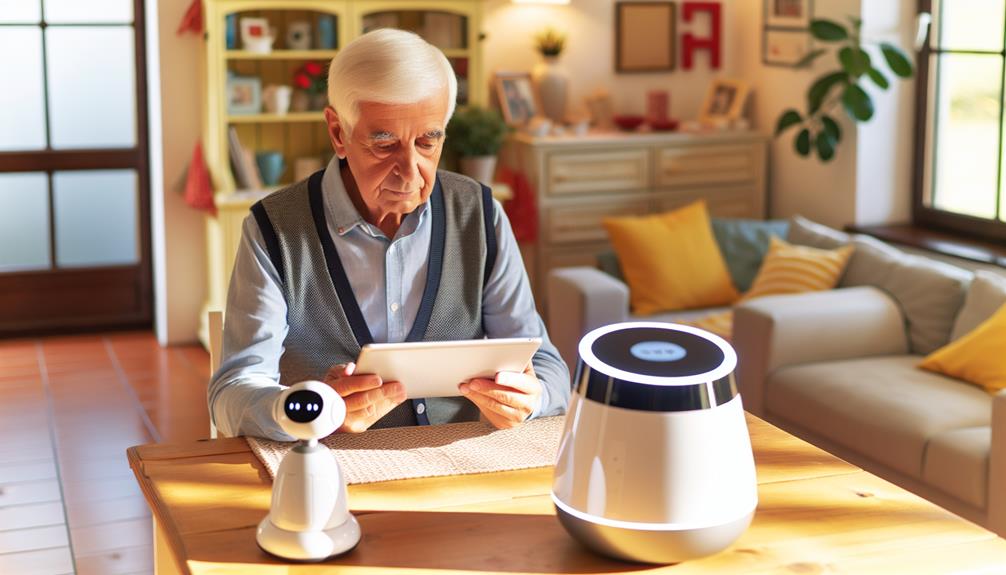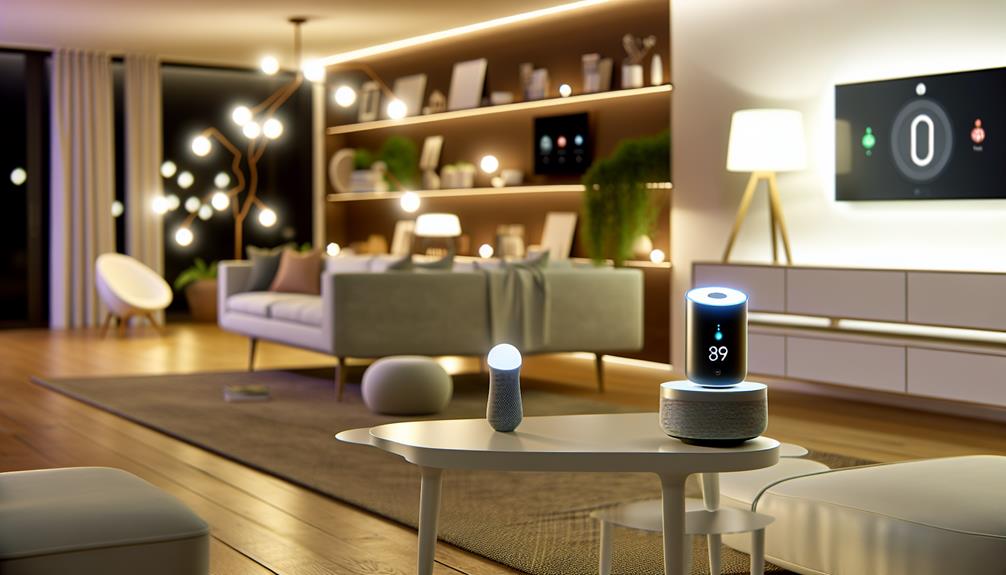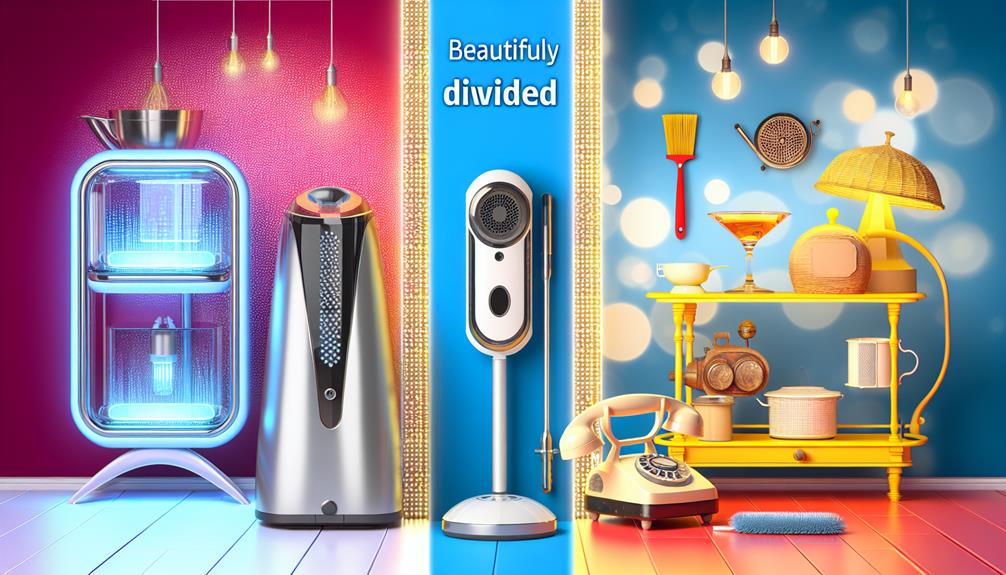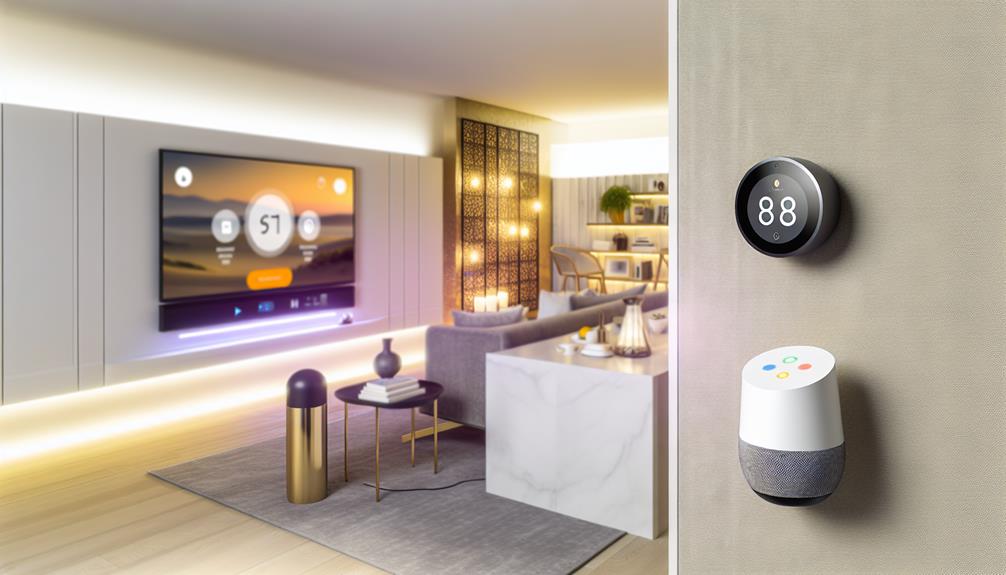Revolutionary Smart Gadgets for Elderly Assistance
The emergence of revolutionary smart gadgets designed for elderly assistance represents a significant advancement in promoting independent living among seniors. These innovative technologies not only enhance communication through voice-activated systems but also facilitate real-time health monitoring and improve home security. Furthermore, the integration of smart lighting and medication management tools underscores a growing commitment to safety and accessibility. As these devices continue to evolve, one must consider the implications they hold for the future of elderly care and the challenges that may arise in their adoption and implementation. What factors will influence their widespread acceptance?
Key takeaways
- Smart health monitoring systems provide real-time tracking of vital signs and immediate emergency alerts, enhancing safety for the elderly.
- Voice-activated assistants enable easy communication and task management, reducing feelings of loneliness and promoting social connectivity.
- Automated home security solutions offer remote monitoring and 24/7 surveillance, ensuring safety and peace of mind for caregivers and seniors.
- Smart lighting solutions enhance visibility and safety by automatically adjusting light levels and providing emergency illumination during power outages.
- Medication management tools simplify medication schedules with reminders and organizers, ensuring seniors adhere to their health regimens effectively.
Benefits of Smart Home Devices
As technology continues to evolve, the integration of smart home devices offers significant benefits for elderly individuals, enhancing their quality of life and promoting independence.
These devices not only provide practical support but also foster a sense of belonging and security within their homes.
One of the primary advantages is energy efficiency. Smart thermostats and lighting systems enable seniors to manage their energy consumption easily, reducing utility costs while minimizing environmental impact.
This feature empowers them to maintain comfortable living conditions without the hassle of manual adjustments.
User accessibility is another critical benefit. Smart home technology, such as automated door locks and security systems, allows elderly individuals to navigate their environments with greater ease and confidence.
With intuitive interfaces and mobile applications, seniors can control their devices from anywhere, ensuring their homes remain safe and welcoming.
Moreover, these advancements facilitate social connections, enabling family members to monitor their loved ones' well-being remotely.
Voice-Activated Assistants
Voice-activated assistants are transforming the way elderly individuals communicate and manage daily tasks.
These devices not only enhance communication capabilities, allowing users to connect with family and friends effortlessly, but also simplify routine activities such as setting reminders and controlling smart home devices.
Enhanced Communication Capabilities
For many elderly individuals, maintaining communication with family and friends can become increasingly challenging due to mobility issues or cognitive decline.
Voice-activated assistants are revolutionizing this aspect of elderly care by enhancing social connectivity without the need for intricate device manipulation. These smart gadgets enable users to effortlessly make phone calls, send messages, or even video chat simply by using their voice.
The ability to communicate effectively can greatly combat feelings of loneliness and isolation, fostering a sense of belonging within the community.
Additionally, many voice-activated assistants exhibit excellent device compatibility, integrating seamlessly with various smartphones, smart home devices, and applications.
This compatibility allows elderly users to connect with their loved ones across multiple platforms, ensuring that they remain engaged and informed.
Daily Task Management
Managing daily tasks can often pose considerable challenges for elderly individuals, especially when dealing with memory lapses or physical limitations. Voice-activated assistants have emerged as invaluable tools in this regard, facilitating seamless daily task management. These smart devices can set task reminders and manage digital calendars with simple voice commands, markedly reducing the cognitive load on users.
By integrating with smart home technology, voice-activated assistants can further enhance independence. For instance, they can remind users to take medications, attend appointments, or engage in social activities, promoting a routine that fosters a sense of belonging. The ability to verbally interact with these devices makes them accessible, even for those who may struggle with traditional interfaces.
Moreover, voice-activated assistants can help in organizing schedules, providing timely notifications that guarantee users stay on track throughout the day. This not only helps in managing daily tasks but also encourages elderly individuals to maintain an active lifestyle by facilitating social interaction and participation in community events.
Ultimately, these smart gadgets serve as an empowering resource, enhancing quality of life while nurturing connections and independence within the elderly community.
Smart Health Monitoring Systems
In today's rapidly advancing technological landscape, smart health monitoring systems have emerged as essential tools for enhancing the well-being of the elderly.
These innovative solutions combine wearable devices and telehealth solutions, ensuring that seniors can maintain their health with ease and confidence.
Key features of smart health monitoring systems include:
- Real-time health tracking: Continuous monitoring of crucial signs such as heart rate and blood pressure.
- Emergency alerts: Immediate notifications sent to caregivers or emergency services in case of abnormal readings.
- Medication reminders: Timely alerts for seniors to take their prescribed medications.
- Remote consultations: Access to healthcare professionals through telehealth solutions, reducing the need for in-person visits.
- User-friendly interfaces: Intuitive designs that facilitate ease of use for seniors.
Automated Home Security Solutions
Automated home security solutions are essential for ensuring the safety and peace of mind of elderly individuals living independently.
Remote monitoring systems allow caregivers and family members to keep an eye on their loved ones from afar, while smart alarm features provide immediate alerts in case of emergencies.
Together, these technologies create a safer living environment, enhancing the overall quality of life for seniors.
Remote Monitoring Systems
Enhancing home safety for the elderly has become increasingly accessible through advanced remote monitoring systems. These systems not only bolster home security but also provide invaluable support for caregivers, enabling them to efficiently oversee the wellbeing of their loved ones from afar.
By integrating remote health technologies, families can guarantee their elderly relatives maintain a safe environment while enjoying greater independence.
Key features of remote monitoring systems include:
- 24/7 Surveillance: Continuous monitoring to detect unusual activity or emergencies.
- Mobile Alerts: Instant notifications sent to caregivers' smartphones for timely intervention.
- User-Friendly Interfaces: Simplified controls that make it easy for seniors to operate.
- Health Tracking: Integration with health monitoring devices to keep track of essential signs.
- Emergency Response Integration: Automatic alerts to emergency services when needed.
These systems foster a sense of safety and belonging, allowing seniors to live in their own homes with confidence.
With the combination of remote health tools and caregiver support, families can rest assured knowing their loved ones are protected and cared for, even when they are not physically present.
Smart Alarm Features
With the rise of smart technology, alarm systems have evolved to offer sophisticated features that greatly enhance home security for the elderly.
Smart alarms now integrate seamlessly with various home automation systems, providing an all-encompassing solution for monitoring safety and well-being.
These advanced systems are designed to deliver real-time emergency notifications to caregivers and family members, ensuring that help is always within reach.
In the event of a breach or emergency, smart alarms can trigger alerts through mobile apps, text messages, or even automated voice calls, fostering a sense of security for both seniors and their loved ones.
Additionally, many smart alarms come equipped with motion sensors and surveillance cameras that can be monitored remotely, allowing caregivers to keep a watchful eye on their elderly family members.
These features not only deter potential intruders but also promote independence, as seniors can feel secure in their own homes.
Smart Lighting for Safety
Smart lighting solutions have emerged as a pivotal component in ensuring the safety and well-being of the elderly. These innovative systems not only enhance visibility but also provide a sense of security, allowing seniors to navigate their homes with confidence.
By incorporating features like motion sensors and adaptive brightness, smart lighting can greatly reduce the risk of accidents and promote independence.
Key benefits of smart lighting for the elderly include:
- Automatic activation: Lights turn on when movement is detected, illuminating dark areas.
- Adaptive brightness: Adjusts light intensity according to the time of day or ambient light levels.
- Remote control: Family members can manage lighting from afar, providing peace of mind.
- Voice activation: Seniors can control lights hands-free using voice commands, enhancing accessibility.
- Emergency alerts: Some systems can notify caregivers in case of unusual patterns in lighting usage.
With these advancements, smart lighting not only enhances the physical safety of elderly individuals but also fosters a sense of belonging, ensuring they feel comfortable and secure in their living spaces.
Investing in such technology is a meaningful step towards empowering our loved ones.
Medication Management Tools
Maintaining health and well-being is paramount for the elderly, and effective medication management plays a crucial role in achieving this goal. Medication management tools have emerged as essential resources that assist seniors in maneuvering their pharmaceutical needs with ease and confidence.
Pill organizers simplify the process of sorting medications, ensuring that dosages are taken correctly throughout the day. Coupled with medication reminders, these tools can send alerts when it's time to take a dose, greatly enhancing adherence tracking.
Digital solutions, such as health apps, further streamline the process by providing prescription alerts and refill notifications directly to a smartphone or tablet.
Additionally, dosage calculators help seniors and caregivers determine the correct amounts of medication based on individual health requirements. With pharmacy integration, these apps can even facilitate direct communication with local pharmacies, making it easier to manage refills and stay on top of medication schedules.
Fall Detection Technologies
Falls represent a significant risk for the elderly, often leading to serious injuries and diminished independence. To mitigate these risks, innovative fall detection technologies have emerged, enhancing safety and peace of mind for seniors and their loved ones.
- Wearable Sensors: These devices can be integrated into clothing or worn as accessories, continuously monitoring the wearer's movements.
- Automatic Alerts: In the event of a fall, the system sends immediate emergency alerts to caregivers or family members.
- Real-Time Monitoring: Many devices provide live tracking, allowing caregivers to respond quickly in case of an incident.
- User-Friendly Interfaces: Designed with simplicity in mind, these technologies guarantee seniors can easily access help when needed.
- Integration with Smart Home Systems: Fall detection systems can work seamlessly with other smart gadgets, creating a thorough safety network.
Frequently Asked Questions
How Much Do Smart Home Devices Typically Cost for Elderly Assistance?
Smart home devices for elderly assistance typically range from $25 to $300, depending on functionality and features. Exploring affordability options and conducting pricing comparisons can greatly aid in selecting cost-effective solutions tailored to individual needs.
Can These Gadgets Be Integrated With Existing Home Systems?
Imagine the seamless harmony of technology within your home. However, integration challenges may arise due to varying system compatibility. Ensuring that new gadgets work cohesively with existing setups is essential for ideal functionality and user experience.
Are There Privacy Concerns With Using Smart Technology for Seniors?
The use of smart technology raises significant privacy concerns, particularly regarding data security and user consent. Ensuring that seniors are informed about data usage and have control over their information is essential for fostering trust and safety.
What Is the Battery Life of Most Smart Health Monitoring Devices?
"An ounce of prevention is worth a pound of cure." Most smart health monitoring devices offer battery longevity ranging from several days to weeks, depending on usage and device maintenance, ensuring consistent support for users' well-being.
Are There Training Resources Available for Seniors to Learn These Technologies?
Yes, numerous training resources are available for seniors, including online tutorials and community workshops. These initiatives foster engagement, providing seniors with the skills necessary to navigate new technologies confidently and effectively, enhancing their overall digital literacy.



